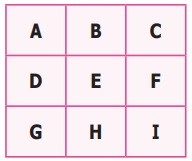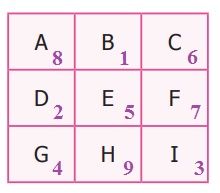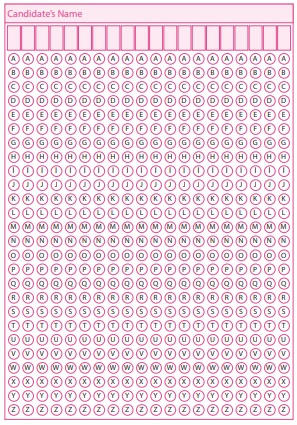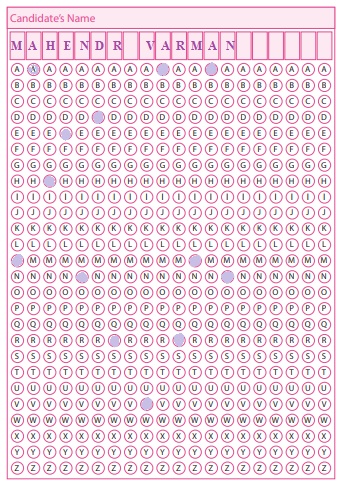Questions with Answers, Solution | Information Processing | Term 3 Chapter 5 | 6th Maths - Exercise 5.2 | 6th Maths : Term 3 Unit 5 : Information Processing
Chapter: 6th Maths : Term 3 Unit 5 : Information Processing
Exercise 5.2
Exercise 5.2
Miscellaneous Practice problems
1.
Find HCF of 188 and 230 by Euclid's game.
H.C.F. of 188 and 230
188 = 2 ├Ś 2 ├Ś 47
230 = 2 ├Ś 5 ├Ś 23
H.C.F. of (188 ,
230) = 2
H.C.F. of (188, 230 ŌłÆ 188)
188 = 2 ├Ś 2 ├Ś 47
42 = 2 ├Ś 3 ├Ś 7
H.C.F. of (188, 42) = 2
H.C.F. of (188 , 230) = H.C.F. of
(188, 230 ŌłÆ 188)
2.
Write the numbers from 1 to 50. From that find the following.
1 2 3 4 5 6 7 8 9 10
11 12 13 14 15 16 17 18 19 20
21 22 23 24 25 26 27 28 29 30
31 32 33 34 35 36 37 38 39 40
41 42 43 44 45 46 47 48 49 50
i)
The numbers which are neither divisible by 2 nor 7.
Answer: 9, 11,
13, 15, 17, 19, 23, 25, 27, 29, 31, 33, 37, 39, 41, 43, 45, 47.
ii)
The prime numbers between 25 and 40.
Answer: 29,
31, 37
iii)
All square numbers upto 50.
Answer: 1, 4,
9, 16, 25, 36, 49
3.
Complete the following pattern
i)
1+2+3+4 = 10
2+3+4+5
= 14
![]() +4+5+6 =
+4+5+6 = ![]()
4+5+6+ ![]() =
= ![]()
1 + 2 + 3 + 4 = 10
2 + 3 + 4 + 5 = 14
3 + 4 + 5 + 6 = 18
4 + 5 + 6 + 7 = 22
ii) 1+3+5+7 = 16
![]() +5+7+9 = 24
+5+7+9 = 24
5+7+9+ ![]() =
= ![]()
7+9+ ![]() +13 =
+13 = ![]()
1 + 3 + 5 + 7 = 16
3 + 5 + 7 + 9 = 24
5 + 7 + 9 + 11 = 32
7 + 9 + 11
+ 13 = 40
iii)
AB, DEF, HIJK, ___ , STUVWX
AB, DEF, HIJK, MNOPQ
, STUVWX
iv)
20, 19, 17, ![]() ,10,5
,10,5
20, 19, 17, 14
, 10, 5
4.
Complete the table by using the following instructions.

A:
It is the 6th term in the Fibonacci sequence.
B:
The predecessor of 2.
C:
LCM of 2 and 3.
D:
HCF of 6 and 20
E:
The reciprocal of 1/5.
F:
The opposite number of ŌĆō7.
G:
The first composite number.
H:
Area of a square of side 3 cm.
I:
The number of lines of symmetry of an equilateral triangle. After completing the
table, what do you observe? Discuss.

After completing the table, what do you observe? Discuss.
Adding rows 15, 14, 16
Adding columns 14, 15, 16
Adding Diagonals 15, 16
5.
Assign the number for English alphabets as 1 for A, 2 for B upto 26 for Z.
Find
the meaning of 
Answer: GOOD MORNING

6.
Replace the letter by symbols as + for A, ŌĆō for B, ├Ś for C and ├Ę for D.
Find the answer for the pattern 4B3C5A30D2 by doing the given operations.
4 B 3 C 5 A 3 0 D 2
4 ŌĆō 3 ├Ś 5 + 30 ├Ę 2
4 ŌłÆ 15 + 15 = 4
7.
Observe the pattern and find the word by hiding the numbers
1H2O3WŌĆā4A5R6EŌĆā7Y8O9U?
1H2O3W 4A5R6E 7Y8O9U?
HOW ARE YOU?
8.
Arrange the following from the eldest to the youngest. What do you get?

A ŌłÆ refers to parents
L ŌłÆ refers to you
F ŌłÆ refers to grandparents
I ŌłÆ refers to elder sister
Y ŌłÆ refers to younger brother
M ŌłÆ refers to uncle
FAMILY
Challenge
problems
9.
Prepare a daily time schedule for evening study at home.
5.30 p.m to 6.30 p.m ŌłÆ Writing Home work.
6.30 p.m to 7.30 p.m ŌłÆ Maths
7.30 p.m to 8.00 p.m ŌłÆ English
8.00 p.m to 9.00 p.m ŌłÆ Tamil, Science and Social science
9.00 p.m to 9.30 p.m ŌłÆ Drawing and extra work.
10.
Observe the geometrical pattern and answer the following questions

i)
Write down the number of sticks used in each of the iterative pattern.
Answer: Number of sticks 3,9,18.
ii)
Draw the next figure in the pattern also find Name the total number sticks used
in it.
Answer:

Number of sticks 30.
11.
Find HCF of 28,35,42 by EuclidŌĆÖs game.
H.C.F. of 28, 35, 42.
28 = 2 ├Ś 2 ├Ś 7
35 = 5 ├Ś 7
42 = 2 ├Ś 3 ├Ś 7
H.C.F. of (28, 35, 42) = 7
H.C.F. of (28, 35 ŌłÆ 28,
42 ŌłÆ 28)
28 = 2 ├Ś 2 ├Ś 7
7 = 1 ├Ś 7
14 = 2 ├Ś 7
H.C.F. of (28, 35 ŌłÆ 28, 42 ŌłÆ 28) = 7
H.C.F. of (28, 35, 42) =
H.C.F. of (28, 35 ŌłÆ28, 42 ŌłÆ28)
12.
Follow the given instructions to fill your name in the OMR sheet.

ŌĆó The
name should be written in capital letters from left to right.
ŌĆó One
alphabet is to be entered in each box.
ŌĆó If
any empty boxes are there at the end they should be left blank.
ŌĆó Ball point pen is to be used for shading the bubbles for the corresponding alphabets.
Answer:

13.
Consider the Postal Index Number (PIN) written on the letters as follows:604506;
604516; 604560; 604506; 604516; 604516; 604560; 604516; 604505; 604470; 604515;
604520;604303; 604509; 604470. How the letters can be sorted as per Postal Index
Numbers?
Answer:
604 is common for all postal index numbers. Compare the remaining 3 digits, 303, 470, 505, 506 (two), 509, 510, 515, 516 (four), 520, 560 (two).
ANSWERS:
Exercise 5.2
1. 2
2. i) 9, 11, 13, 15,
17, 19, 23, 25, 27, 29, 31, 33, 37, 39, 41, 43, 45, 47 ii) 29, 31, 37 iii) 1,4,
9, 16, 25, 36, 49
3. i) 3, 18; 7, 22 ii)
3; 11,32; 11, 40
iii) MNOPQ iv) 14
4. A-8, B-1, C-6, D-2,
E-5, F-7, G-4, H-9, I-3
5. GOOD MORNING
6. 4
7. HOW ARE YOU?
8. FAMILY
10. i) 3, 9, 18 ii)  30
30
11. 7
13. 604 is common for
all postal index numbers. Compare the remaining 3 digits, 303, 470, 505, 506
(two), 509, 510, 515, 516 (four), 520, 560 (Two)
Related Topics